| Listing 1 - 7 of 7 |
Sort by
|
Book
Year: 2009 Publisher: Cheltenham, UK ; Northampton, MA : Edward Elgar,
Abstract | Keywords | Export | Availability | Bookmark
 Loading...
Loading...Choose an application
- Reference Manager
- EndNote
- RefWorks (Direct export to RefWorks)
Copyright and electronic data processing. --- Peer-to-peer architecture (Computer networks) --- Copyright infringement. --- Droit d'auteur et informatique. --- P2P (Réseaux d'ordinateurs) --- Infractions au droit d'auteur. --- Comparative law --- Droit comparé --- Law and legislation. --- Droit
Book
ISBN: 9782744064210 Year: 2010 Publisher: Paris : Pearson,
Abstract | Keywords | Export | Availability | Bookmark
 Loading...
Loading...Choose an application
- Reference Manager
- EndNote
- RefWorks (Direct export to RefWorks)
A ceux qui dénoncent le piratage et le règne du "gratuit" dans les industries du divertissement, l'auteur oppose ici l'idée d'un marché de plus en plus mature, mélangeant gratuit et payant, où se mettent en place de nouvelles règles financières liées aux modèles participatifs, où est optimisé le phénomène de la longue traîne et où se développent des stratégies de fidélisation.
Internet --- Peer-to-peer architecture (Computer networks) --- Piracy (Copyright) --- Music --- Internet marketing --- Leisure industry --- P2P (Réseaux d'ordinateurs) --- Piratage (Droit d'auteur) --- Musique --- Marketing sur Internet --- Loisirs --- Economic aspects --- Computer network resources --- Aspect économique --- Ressources Internet --- Industrie --- Digital media --- Technology --- Information society --- Internet entertainment industries --- Online social networks. --- Social aspects. --- Computer network resources. --- P2P (Réseaux d'ordinateurs) --- Aspect économique --- Economic aspects. --- Piratage (droit d'auteur) --- Web 2.0 --- Droit d'auteur --- Musique sur Internet --- Poste à poste (Internet)
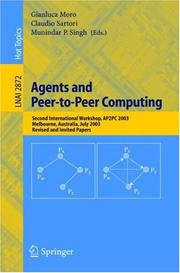
ISBN: 9783540240532 3540240535 9783540258407 9786610307937 1280307935 354025840X Year: 2005 Publisher: Berlin, Heidelberg : Springer Berlin Heidelberg : Imprint: Springer,
Abstract | Keywords | Export | Availability | Bookmark
 Loading...
Loading...Choose an application
- Reference Manager
- EndNote
- RefWorks (Direct export to RefWorks)
Peer-to-peer (P2P) computing is currently attracting enormous public attention, spurred by the popularity of file-sharing systems such as Napster, Gnutella, Morpheus, Kaza, and several others. In P2P systems, a very large number of autonomous computing nodes, the peers, rely on each other for services. P2P networks are emerging as a new distributed computing paradigm because of their potential to harness the computing power and the storage capacity of the hosts composing the network, and because they realize a completely open decentralized environment where everybody can join in autonomously. Although researchers working on distributed computing, multiagent systems, databases, and networks have been using similar concepts for a long time, it is only recently that papers motivated by the current P2P paradigm have started appearing in high quality conferences and workshops. In particular, research on agent systems appears to be most relevant because multiagent systems have always been thought of as networks of autonomous peers since their inception. Agents, which can be superimposed on the P2P architecture, embody the description of task environments, decision-support capabilities, social behaviors, trust and reputation, and interaction protocols among peers. The emphasis on decentralization, autonomy, ease, and speed of growth that gives P2P its advantages also leads to significant potential problems. Most prominent among these are coordination – the ability of an agent to make decisions on its own actions in the context of activities of other agents, and scalability – the value of the P2P systems in how well they self-organize so as to scale along several dimensions, including complexity, heterogeneity of peers, robustness, traffic redistribution, etc. This book brings together an introduction, three invited articles, and revised versions of the papers presented at the Second International Workshop on Agents and Peer-to-Peer Computing, AP2PC 2003, held in Melbourne, Australia, July 2003.
Peer-to-peer architecture (Computer networks) --- Intelligent agents (Computer software) --- P2P (Réseaux d'ordinateurs) --- Agents intelligents (Logiciels) --- Congresses. --- Congrès --- Mechanical Engineering --- Engineering & Applied Sciences --- Electrical & Computer Engineering --- Computer Science --- Mechanical Engineering - General --- Telecommunications --- Information Technology --- Artificial Intelligence --- Computer Communication Networks. --- Artificial intelligence. --- Artificial Intelligence. --- AI (Artificial intelligence) --- Artificial thinking --- Electronic brains --- Intellectronics --- Intelligence, Artificial --- Intelligent machines --- Machine intelligence --- Thinking, Artificial --- Bionics --- Cognitive science --- Digital computer simulation --- Electronic data processing --- Logic machines --- Machine theory --- Self-organizing systems --- Simulation methods --- Fifth generation computers --- Neural computers --- Computer communication systems. --- Communication systems, Computer --- Computer communication systems --- Data networks, Computer --- ECNs (Electronic communication networks) --- Electronic communication networks --- Networks, Computer --- Teleprocessing networks --- Data transmission systems --- Digital communications --- Electronic systems --- Information networks --- Telecommunication --- Cyberinfrastructure --- Network computers --- Distributed processing
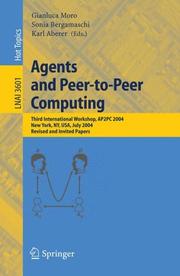
ISBN: 9783540297550 3540297553 3540316574 Year: 2005 Publisher: Berlin, Heidelberg : Springer Berlin Heidelberg : Imprint: Springer,
Abstract | Keywords | Export | Availability | Bookmark
 Loading...
Loading...Choose an application
- Reference Manager
- EndNote
- RefWorks (Direct export to RefWorks)
Peer-to-peer (P2P) computing is attracting enormous media attention, spurred by the popularity of file sharing systems such as Napster, Gnutella, and Morpheus. The peers are autonomous, or as some call them, first-class citizens. P2P networks are emerging as a new distributed computing paradigm for their potential to harness the computing power of the hosts composing the network and make their under-utilized resources available to others. Although researchers working on distributed computing, multiagent systems, databases and networks have been using similar concepts for a long time, it is only recently that papers motivated by the current P2P paradigm have started appearing in high-quality conferences and workshops. Research in agent systems in particular appears to be most relevant because, since their inception, multiagent systems have always been thought of as networks of peers. The multiagent paradigm can thus be superimposed on the P2P architecture, where agents embody the description of the task environments, the decision-support capabilities, the collective behavior, and the interaction protocols of each peer. The emphasis in this context on decentralization, user autonomy, ease and speed of growth that gives P2P its advantages also leads to significant potential problems. Most prominent among these problems are coordination, the ability of an agent to make decisions on its own actions in the context of activities of other agents, and scalability, the value of the P2P systems lies in how well they scale along several dimensions, including complexity, heterogeneity of peers, robustness, traffic redistribution, and so on. This volume presents the fully revised papers presented at the Third International Workshop on Agents and Peer-to-Peer Computing, AP2PC 2004, held in New York City on July 19, 2004 in the context of the Third International Joint Conference on Autonomous Agents and Multi-Agent Systems (AAMAS 2004). The volume is organized in topical sections on P2P networks and search performance, emergent communities and social behaviours, semantic integration, mobile P2P systems, adaptive systems, agent-based resource discovery, as well as trust and reputation.
Peer-to-peer architecture (Computer networks) --- Intelligent agents (Computer software) --- P2P (Réseaux d'ordinateurs) --- Agents intelligents (Logiciels) --- Congresses. --- Congrès --- Computer Science --- Mechanical Engineering - General --- Telecommunications --- Engineering & Applied Sciences --- Mechanical Engineering --- Electrical & Computer Engineering --- Information Technology --- Artificial Intelligence --- Computer science. --- Computer communication systems. --- Information storage and retrieval. --- Artificial intelligence. --- Computers and civilization. --- Computer Science. --- Computer Communication Networks. --- Artificial Intelligence (incl. Robotics). --- Information Systems Applications (incl. Internet). --- Information Storage and Retrieval. --- Computers and Society. --- Civilization and computers --- Civilization --- AI (Artificial intelligence) --- Artificial thinking --- Electronic brains --- Intellectronics --- Intelligence, Artificial --- Intelligent machines --- Machine intelligence --- Thinking, Artificial --- Bionics --- Cognitive science --- Digital computer simulation --- Electronic data processing --- Logic machines --- Machine theory --- Self-organizing systems --- Simulation methods --- Fifth generation computers --- Neural computers --- Communication systems, Computer --- Computer communication systems --- Data networks, Computer --- ECNs (Electronic communication networks) --- Electronic communication networks --- Networks, Computer --- Teleprocessing networks --- Data transmission systems --- Digital communications --- Electronic systems --- Information networks --- Telecommunication --- Cyberinfrastructure --- Network computers --- Informatics --- Science --- Distributed processing --- Information storage and retrieva. --- Artificial Intelligence. --- Information storage and retrieval systems. --- Automatic data storage --- Automatic information retrieval --- Automation in documentation --- Computer-based information systems --- Data processing systems --- Data storage and retrieval systems --- Discovery systems, Information --- Information discovery systems --- Information processing systems --- Information retrieval systems --- Machine data storage and retrieval --- Mechanized information storage and retrieval systems --- Computer systems --- Electronic information resources --- Data libraries --- Digital libraries --- Information organization --- Information retrieval --- Application software. --- Application computer programs --- Application computer software --- Applications software --- Apps (Computer software) --- Computer software
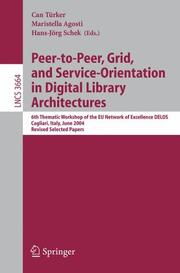
ISBN: 9783540287117 3540287116 3540287124 Year: 2005 Publisher: Berlin, Heidelberg : Springer Berlin Heidelberg : Imprint: Springer,
Abstract | Keywords | Export | Availability | Bookmark
 Loading...
Loading...Choose an application
- Reference Manager
- EndNote
- RefWorks (Direct export to RefWorks)
Peer-to-peer architecture (Computer networks) --- P2P (Réseaux d'ordinateurs) --- Congresses. --- Congrès --- Computer Science --- Telecommunications --- Electrical & Computer Engineering --- Engineering & Applied Sciences --- Computational grids (Computer systems) --- Digital libraries --- Computer architecture --- Computer science. --- Computer communication systems. --- Database management. --- Information storage and retrieval. --- Multimedia information systems. --- User interfaces (Computer systems). --- Computer Science. --- Database Management. --- Information Systems Applications (incl. Internet). --- Information Storage and Retrieval. --- User Interfaces and Human Computer Interaction. --- Computer Communication Networks. --- Multimedia Information Systems. --- Interfaces, User (Computer systems) --- Human-machine systems --- Human-computer interaction --- Computer-based multimedia information systems --- Multimedia computing --- Multimedia information systems --- Multimedia knowledge systems --- Information storage and retrieval systems --- Data base management --- Data services (Database management) --- Database management services --- DBMS (Computer science) --- Generalized data management systems --- Services, Database management --- Systems, Database management --- Systems, Generalized database management --- Electronic data processing --- Communication systems, Computer --- Computer communication systems --- Data networks, Computer --- ECNs (Electronic communication networks) --- Electronic communication networks --- Networks, Computer --- Teleprocessing networks --- Data transmission systems --- Digital communications --- Electronic systems --- Information networks --- Telecommunication --- Cyberinfrastructure --- Network computers --- Informatics --- Science --- Distributed processing --- Information storage and retrieva. --- Multimedia systems. --- Information storage and retrieval systems. --- Automatic data storage --- Automatic information retrieval --- Automation in documentation --- Computer-based information systems --- Data processing systems --- Data storage and retrieval systems --- Discovery systems, Information --- Information discovery systems --- Information processing systems --- Information retrieval systems --- Machine data storage and retrieval --- Mechanized information storage and retrieval systems --- Computer systems --- Electronic information resources --- Data libraries --- Information organization --- Information retrieval --- Application software. --- Application computer programs --- Application computer software --- Applications software --- Apps (Computer software) --- Computer software
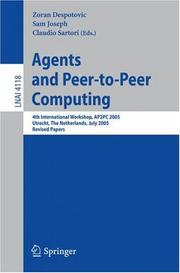
ISBN: 9783540490258 3540490256 3540689672 Year: 2006 Publisher: Berlin, Heidelberg : Springer Berlin Heidelberg : Imprint: Springer,
Abstract | Keywords | Export | Availability | Bookmark
 Loading...
Loading...Choose an application
- Reference Manager
- EndNote
- RefWorks (Direct export to RefWorks)
Peer-to-peer architecture (Computer networks) --- Intelligent agents (Computer software) --- P2P (Réseaux d'ordinateurs) --- Agents intelligents (Logiciels) --- Congresses. --- Congrès --- Computer Science --- Telecommunications --- Mechanical Engineering - General --- Engineering & Applied Sciences --- Electrical & Computer Engineering --- Mechanical Engineering --- Information Technology --- Artificial Intelligence --- Computer science. --- Computer communication systems. --- Information storage and retrieval. --- Artificial intelligence. --- Computers and civilization. --- Computer Science. --- Computer Communication Networks. --- Artificial Intelligence (incl. Robotics). --- Information Systems Applications (incl. Internet). --- Information Storage and Retrieval. --- Computers and Society. --- Civilization and computers --- Civilization --- AI (Artificial intelligence) --- Artificial thinking --- Electronic brains --- Intellectronics --- Intelligence, Artificial --- Intelligent machines --- Machine intelligence --- Thinking, Artificial --- Bionics --- Cognitive science --- Digital computer simulation --- Electronic data processing --- Logic machines --- Machine theory --- Self-organizing systems --- Simulation methods --- Fifth generation computers --- Neural computers --- Communication systems, Computer --- Computer communication systems --- Data networks, Computer --- ECNs (Electronic communication networks) --- Electronic communication networks --- Networks, Computer --- Teleprocessing networks --- Data transmission systems --- Digital communications --- Electronic systems --- Information networks --- Telecommunication --- Cyberinfrastructure --- Network computers --- Informatics --- Science --- Distributed processing --- Information storage and retrieva. --- Artificial Intelligence. --- Information storage and retrieval systems. --- Automatic data storage --- Automatic information retrieval --- Automation in documentation --- Computer-based information systems --- Data processing systems --- Data storage and retrieval systems --- Discovery systems, Information --- Information discovery systems --- Information processing systems --- Information retrieval systems --- Machine data storage and retrieval --- Mechanized information storage and retrieval systems --- Computer systems --- Electronic information resources --- Data libraries --- Digital libraries --- Information organization --- Information retrieval --- Application software. --- Application computer programs --- Application computer software --- Applications software --- Apps (Computer software) --- Computer software
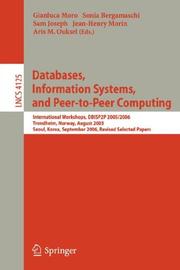
ISBN: 9783540716600 3540716602 3540716610 Year: 2007 Publisher: Berlin, Germany ; New York, New York : Springer,
Abstract | Keywords | Export | Availability | Bookmark
 Loading...
Loading...Choose an application
- Reference Manager
- EndNote
- RefWorks (Direct export to RefWorks)
The aim of the International Workshop on Databases, Information Systems and P2P Computing was to explore the promise of P2P to o?er exciting new p- sibilities in distributed information processing and database technologies. The realization of this promise lies fundamentally in the availability of enhanced services such as structured ways for classifying and registering shared infor- tion, veri?cation and certi?cation of information, content distributed schemes and quality of content, security features, information discovery and accessib- ity, interoperation and composition of active information services, and ?nally market-based mechanisms to allow cooperative and noncooperative information exchanges. The P2P paradigm lends itself to constructing large-scale, complex, adaptive, autonomous and heterogeneous database and information systems, endowed with clearly speci?ed and di?erential capabilities to negotiate, bargain, coordinate and self-organize the information exchanges in large-scale networks. This vision will have a radical impact on the structure of complex organizations (business, sci- ti?c or otherwise) and on the emergence and the formation of social communities, and on how the information is organized and processed. The P2P information paradigm naturally encompasses static and wireless connectivity and static and mobile architectures. Wireless connectivity combined with the increasingly small and powerful mobile devices and sensors poses new challenges as well as opp- tunities to the database community. Information becomes ubiquitous, highly distributed and accessible anywhere and at any time over highly dynamic, - stable networks with very severe constraints on the information management and processing capabilities.
Peer-to-peer architecture (Computer networks) --- Database management --- Management information systems --- P2P (Réseaux d'ordinateurs) --- Bases de données --- Systèmes d'information de gestion --- Congresses. --- Congrès --- Gestion --- Database management -- Congresses. --- Electronic books. -- local. --- Management information systems -- Congresses. --- Peer-to-peer architecture (Computer networks) -- Congresses. --- Engineering & Applied Sciences --- Electrical & Computer Engineering --- Telecommunications --- Computer Science --- Computer science. --- Computer communication systems. --- Software engineering. --- Database management. --- Information storage and retrieval. --- Artificial intelligence. --- Computer Science. --- Computer Communication Networks. --- Database Management. --- Information Storage and Retrieval. --- Information Systems Applications (incl. Internet). --- Software Engineering. --- Artificial Intelligence (incl. Robotics). --- AI (Artificial intelligence) --- Artificial thinking --- Electronic brains --- Intellectronics --- Intelligence, Artificial --- Intelligent machines --- Machine intelligence --- Thinking, Artificial --- Bionics --- Cognitive science --- Digital computer simulation --- Electronic data processing --- Logic machines --- Machine theory --- Self-organizing systems --- Simulation methods --- Fifth generation computers --- Neural computers --- Data base management --- Data services (Database management) --- Database management services --- DBMS (Computer science) --- Generalized data management systems --- Services, Database management --- Systems, Database management --- Systems, Generalized database management --- Computer software engineering --- Engineering --- Communication systems, Computer --- Computer communication systems --- Data networks, Computer --- ECNs (Electronic communication networks) --- Electronic communication networks --- Networks, Computer --- Teleprocessing networks --- Data transmission systems --- Digital communications --- Electronic systems --- Information networks --- Telecommunication --- Cyberinfrastructure --- Network computers --- Informatics --- Science --- Distributed processing --- Information storage and retrieva. --- Artificial Intelligence. --- Information storage and retrieval systems. --- Automatic data storage --- Automatic information retrieval --- Automation in documentation --- Computer-based information systems --- Data processing systems --- Data storage and retrieval systems --- Discovery systems, Information --- Information discovery systems --- Information processing systems --- Information retrieval systems --- Machine data storage and retrieval --- Mechanized information storage and retrieval systems --- Computer systems --- Electronic information resources --- Data libraries --- Digital libraries --- Information organization --- Information retrieval --- Application software. --- Application computer programs --- Application computer software --- Applications software --- Apps (Computer software) --- Computer software
| Listing 1 - 7 of 7 |
Sort by
|

 Search
Search Feedback
Feedback About
About Help
Help News
News